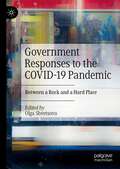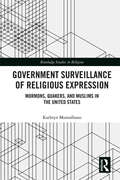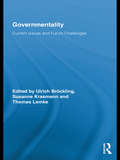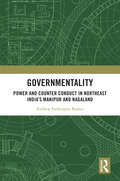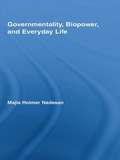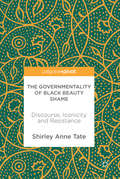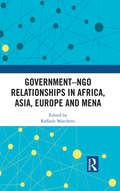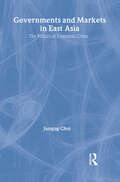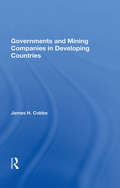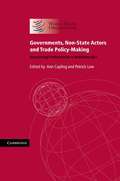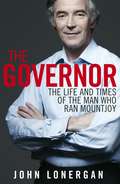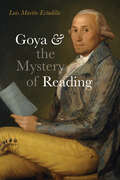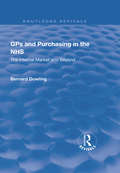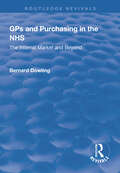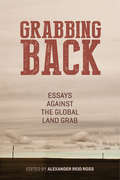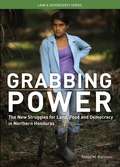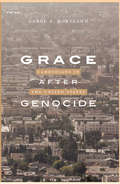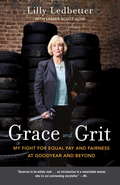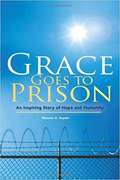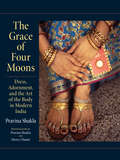- Table View
- List View
Government Responses to the COVID-19 Pandemic: Between a Rock and a Hard Place
by Olga ShvetsovaThis book examines how governments around the world responded to the health emergency created by the COVID-19 pandemic. Before vaccines became available, non-medical interventions were the main means to protect the public. Non-medical interventions were put in place by governments as public health policies. In every nation, politicians and governments faced a choice situation, and worldwide, they made different choices. Public health policies came at a price, in economic, social, and ultimately electoral costs to the political incumbents. The book discusses differences in governments’ policy efforts to mitigate the virus spread. The authors conduct in-depth analysis of country-cases from Africa, North and South America, Asia, and Europe. They also offer small-n- comparative analyses as well as report global patterns and trends of governments’ responsiveness to the medical emergency. It will appeal to all those interested in public policy, health policy and governance.
Government Surveillance of Religious Expression: Mormons, Quakers, and Muslims in the United States (Routledge Studies in Religion)
by Kathryn MontalbanoRecent revelations about government surveillance of citizens have led to questions about whether there should be better defined boundaries around privacy. Should government officials have the right to specifically target certain groups for extended surveillance? United States municipal, territorial, and federal agencies have investigated religious groups since the nineteenth century. While critics of contemporary mass surveillance tend to invoke the infringement of privacy, the mutual protection of religion and public expression by the First Amendment positions them, along with religious expression, comfortably within in the public sphere.This book analyzes government monitoring of Mormons of the Territory of Utah in the 1870s and 1880s for polygamy, Quakers of the American Friends Service Committee (AFSC) from the 1940s to the 1960s for communist infiltration, and Muslims of Brooklyn, New York, from 2002 to 2013 for suspected terrorism. Government agencies in these case studies attempted to understand how their religious beliefs might shape their actions in the public sphere. It follows that government agents did not just observe these communities, but they probed precisely what constituted religion itself alongside shifting legal and political definitions relative to their respective time periods. Together, these case studies form a new framework for discussions of the historical and contemporary monitoring of religion. They show that government surveillance is less predictable and monolithic than we might assume. Therefore, this book will be of great interest to scholars of United States religion, history, and politics, as well as surveillance and communication studies.
Government through Culture and the Contemporary French Right
by Jeremy AhearneCulture, understood broadly, lay at the heart of contrasting right-wing strategies for government in France during the pivotal decade of 2002-2012. Looking at issues of secularism, education, televisual performance, public memory and nation-branding Ahearne analyses how presidents Chirac and Sarkozy sought to redefine contemporary French identity.
Government Today Workbook
by Beverly VaillancourtThis book contains unit lessons on Government and the Rights of People Workbook Activity, Freedoms-You and the Constitution, The Executive Branch, The Offices of the Executive Branch, The Legislative Branch and The Judicial Branch.
Governmentality: Current Issues and Future Challenges (Routledge Studies in Social and Political Thought)
by Ulrich BröcklingExamining questions of statehood, biopolitics, sovereignty, neoliberal reason and the economy, Governmentality explores the advantages and limitations of adopting Michel Foucault's concept of governmentality as an analytical framework. Contributors highlight the differences as well as possible convergences with alternative theoretical frameworks. By assembling authors with a wide range of different disciplinary backgrounds, from philosophy, literature, political science, sociology to medical anthropology, the book offers a fresh perspective on studies of governmentality.
Governmentality: Power and Counter Conduct in Northeast India’s Manipur and Nagaland
by Andrew Lathuipou KameiThis volume examines how protest movement counter-conducts the ways in which the citizens have been governed. It studies the rationale, forms, technologies, techniques, practices, and impact of two protest movements in Northeast India: the tribal movement led by the Joint Action Committee Against Anti-Tribal Bills (hereafter JACAATB) in Manipur, and the anti-corruption movement led by the Against Corruption and Unabated Taxation (ACAUT) in Nagaland. The study is an ethnographic enquiry into three counter-conduct approaches: • First, the attempt at disciplining the local state government through the adoption and deployment of certain technologies of citizenship, making individuals politically active and capable of self-governance; • Second, the desire for truth through the usage of Right to Information Act and the judicial inquiry against the misconducts of the state governments; • Third, counter-conduct activities through techniques of critique and self-examination to not only resist or evade the state, but also usher in new subjectivities and forms of governance. An in-depth look at citizenship and state in contemporary Northeast India, this volume will be of interest to scholars and students of political science, governance, public policy, Northeast Studies, and South Asia studies.
Governmentality, Biopower, and Everyday Life (Routledge Studies in Social and Political Thought #Vol. 57)
by Majia Holmer NadesanGovernmentality, Biopower, and Everyday Life synthesizes and extends the disparate strands of scholarship on Foucault's notions of governmentality and biopower and grounds them in familiar social contexts including the private realm, the market, and the state/military. Topics include public health, genomics, behavioral genetics, neoliberal market logics and technologies, philanthropy, and the war on terror. This book is designed for readers interested in a rigorous, comprehensive introduction to the wide array of interdisciplinary work focusing on Foucault, biopower and governmentality. However, Nadesan does not merely reproduce existing literatures but also responds to implicit critiques made by Cultural Studies and Marxist scholarship concerning identity politics, political economy, and sovereign force and disciplinary control. Using concrete examples and detailed illustrations throughout, this book extends the extant literature on governmentality and biopower and helps shape our understanding of everyday life under neoliberalism.
The Governmentality of Black Beauty Shame
by Shirley Anne TateThis book uses the experiences and conversations of Black British women as a lens to examine the impact of discourses surrounding Black beauty shame. Black beauty shame exists within racialized societies which situate white beauty as iconic, and as a result produce Black ‘ugliness’ as a counterpoint. At the same time, Black Nationalist discourses present Black-white ‘mixed race’ women as bodies out of place within the Black community. In the examples analysed within the book, women disidentify from both the iconicities of white beauty and the discourses of Black Nationalist darker-skinned beauty, negating both ideals. This demonstration of Foucaldian counter-conduct can be read as a form of disalienation from the governmentality of Black beauty shame. This fascinating volume will be of interest to students and scholars of Black identity, Black beauty and discourse analysis.
Government–NGO Relationships in Africa, Asia, Europe and MENA
by Raffaele MarchettiThis volume brings together some of the most recent scholarship on government and civil society. It examines the axis of the relationship between national governments and civil society organisations (NGOs) by highlighting commonalities as well as differences among four key regions in the world. Using the stability vs. instability framework, the book explores a range of pertinent issues, including human rights, development, foreign policy, state-building, regime change, governance frameworks, wars and civil liberties. It studies diverse situations, from those entailing comprehensive cooperation to those involving politically contentious and revolutionary activities. With case studies from Africa, Asia, Europe, and the Middle East and North Africa (MENA), this volume will be useful to scholars and researchers of political science, global politics, international relations, sociology, development studies, global governance and public policy, as well as to those in the development sector and NGOs.
Governments and Markets in East Asia: The Politics of Economic Crises (Routledge Malaysian Studies Series #Vol. 3)
by Jungug ChoiGovernments and Markets in East Asia examines the relationship between economic performance, elite co-operation, and political regime stability in the context of the Asian crisis, and argues that economic crisis is not the cause of greater political harmony or discord, but rather that it serves as a catalyst that may encourage elites to cooperate or conflict depending upon the particular circumstances at the time of crisis. This book maintains that the political consequences of the Asian crisis varied according to the type of elite that existed in each stricken society. Including a comprehensive comparative study of five countries' experiences during the economic crisis: Indonesia, Thailand, Malaysia, South Korea and the Philippines, this book investigates the pre-crisis political context and elite configuration of these five countries, and considers what lessons can be drawn from their experiences. Constituting an impressive body of descriptive and theoretical material on the Asian crisis, this book looks towards the implications of economic crisis for elite behaviour and political stability.
Governments And Mining Companies In Developing Countries
by James H. CobbeThis book examines the relationship between the governments of less developed countries (LDCs) and foreign-owned firms engaged in the extraction of minerals for export. With an approach that synthesizes economic theory, technical considerations, and political factors, Cobbe provides a fresh look at the policy aspects of the "resource bargaining pro
Governments, Non-State Actors and Trade Policy-Making
by Ann Capling Patrick LowOne of the most pressing issues confronting the multilateral trade system is the challenge posed by the rapid proliferation of preferential trade agreements. Plenty has been written about why governments might choose to negotiate preferentially or multilaterally, but until now it has been written almost exclusively from the perspective of governments. We know very little about how non-state actors view this issue of 'forum choice', nor how they position themselves to influence choices by governments about whether to emphasize PTAs or the WTO. This book addresses that issue squarely through case studies of trade policy-making and forum choice in eight developing countries: Chile, Colombia, Mexico, South Africa, Kenya, Jordan, Indonesia and Thailand. The case studies are based on original research by the authors, including interviews with state and non-state actors involved in the trade policy-making process in the eight countries of this study.
The Governor
by John LonerganIn his talks to communities throughout the length and breath of Ireland, John Lonergan finds himself coming back to one theme: the importance of kindness. It is an unexpected theme for the former boss of Ireland's biggest and toughest prison, Mountjoy, but then John Lonergan is an unusual man. John entered the prison service in 1968 and in the years that followed, as he saw human nature at its worst - and often, unexpectedly, at its best - he developed a deep understanding both of human nature and of Irish society.Now, after 42 years in the service, 26 of them as the most senior prison officer in the country, John tells his fascinating life story - from his idyllic childhood in rural Tipperary, to coming face to face with the ugliest face of Irish life, to grappling with the politics of working in a service that was the plaything of officials and politicians. His description of life in the prison service is not only a gripping account of humanity at its rawest, but also an invaluable primer for anyone in top level management.Revealing, surprising and inspiring The Governor gives a unique insight into modern Ireland.
Goya and the Mystery of Reading
by Luis Martín-EstudilloSpanish artist Francisco de Goya (1746–1828) lived through an era of profound societal change. One of the transformations that he engaged passionately was the unprecedented growth both in the number of readers and in the quantity and diversity of texts available. He documented and questioned this reading revolution in some of his most captivating paintings, prints, and drawings.Goya and the Mystery of Reading explores the critical impact this transition had on the work of an artist who aimed not to copy the world around him, but to see it anew—to read it. Goya's creations offer a sustained reflection on the implications of reading, which he depicted as an ambiguous, often mysterious activity: one which could lead to knowledge or ecstasy, to self-fulfillment or self-destruction, to piety or perdition. At the same time, he used reading to elicit new possibilities of interpretation. This book reveals for the first time the historical, intellectual, and artistic underpinnings of reading as one of the pillars of his art.
GPR Remote Sensing in Archaeology
by Dean Goodman Salvatore PiroGPR Remote Sensing in Archaeology provides a complete description of the processes needed to take raw GPR data all the way to the construction of subsurface images. The book provides an introduction to the "theory" of GPR by using a simulator that shows how radar profiles across simple model structures look and provides many examples so that the complexity of radar signatures can be understood. It continues with a review of the necessary radargram signal processes needed along with examples. The most comprehensive methodology to construct subsurface images from either coarsely spaced data using interpolation or from dense data from multi-channel equipment and 3D volume generation is presented, advanced imaging solutions such as overlay analysis are introduced, and numerous worldwide site case histories are shown. The authors present their studies in a way that most technical and non-technical users of the equipment will find essentials for implementing in their own subsurface investigations.
GPs and Purchasing in the NHS: The Internal Market and Beyond (Routledge Revivals)
by Bernard DowlingThis title was first published in 2000: The relative performance of health authorities and general practitioners as commissioners of health care services is a crucial question in the current health care policy debate, but hitherto a poorly researched area. This work addresses that topic, and represents a systematic direct comparison of GPs and health authorities as purchasers of health care services. In doing this it centres upon two of the chief controversies about the NHS internal market: the equality of hospital waiting times for fund-holding patients, and the fairness of the budgets received by fund-holding practices for commissioning effective surgery. In discussing the policy implications of the research, the book then addresses what lessons should be learned from the internal market about equity and efficiency in the service now that the present Labour Government is reforming the NHS with the introduction of Primary Care Groups and Primary Care Trusts
GPs and Purchasing in the NHS: The Internal Market and Beyond (Routledge Revivals)
by Bernard DowlingThis title was first published in 2000: The relative performance of health authorities and general practitioners as commissioners of health care services is a crucial question in the current health care policy debate, but hitherto a poorly researched area. This work addresses that topic, and represents a systematic direct comparison of GPs and health authorities as purchasers of health care services. In doing this it centres upon two of the chief controversies about the NHS internal market: the equality of hospital waiting times for fund-holding patients, and the fairness of the budgets received by fund-holding practices for commissioning effective surgery. In discussing the policy implications of the research, the book then addresses what lessons should be learned from the internal market about equity and efficiency in the service now that the present Labour Government is reforming the NHS with the introduction of Primary Care Groups and Primary Care Trusts.
GPs, Politics and Medical Professional Protest in Britain, 1880–1948 (Routledge Studies in Modern British History)
by Chris LockeThis book charts the journey of British General Practitioners (GPs) towards professional self-realisation through the development of a political consciousness manifested in a series of bruising encounters with government. GPs are an essential part of the social fabric of modern Britain but as a group have always felt undervalued, clashing with successive governments over the terms on which they offered their services to the public. Explaining the background to these disputes and the motives of GPs from a sociological perspective, this research casts new light on some defining moments in the creation of the modern British state, from National Health Insurance to the National Health Service, and the history of the British medical profession. It examines these events from the point of view of the professionals intimately involved in and affected by them, using both established sources, like Ministry of Health records, an in-depth analysis of rarely studied records of professional bodies, and previously unresearched archive material. The result is a fascinating account of conflict and cooperation, and of heroic, and less-than-heroic, defiance of political authority, involving interactions between complex personalities and competing ideologies. Scholarly yet readable, this book will be of interest to the general reader as much as to medical practitioners and historians.
Grabbing Back
by Vandana Shiva Alexander Reid Ross Noam Chomsky"Land grabs are a global phenomenon of our times, driven by the ever increasing demands of both global corporations and the governments with which they are allied. But as this powerful and timely book demonstrates, ordinary citizens, small farmers and ordinary citizens around the world are standing up to defend their own with passion and ingenuity, and they are recording successes that are both extraordinary and inspiring." -Oliver Tickell, Editor, The Ecologist.Climate change ravages the earth, while wealthy elites try to grab as much of the world's diminishing resources as possible. As Vandana Shiva writes, land is life. But land, and the struggle to possess it, is also power-colonial and corporate power, to be sure, but also the power of the dispossessed to rise up and call for an end to the global land grab.Grabbing Back maps this struggle, bringing together analyses that uncover the politics of cultivation and control. In this unprecedented collection, on-the-ground activists join forces with critically acclaimed scholars to document the commodification and consumption of space, from foreclosed homes to annihilated rainforests, from ecotourism in Sri Lanka to the tar sands of Montana, and to outline the strategies and tactics that might the destruction.With contributions by Vandana Shiva, Noam Chomsky, Max Rameau, Grace Lee Boggs, Michael Hardt, Ahjamu Umi, Ben Dangl, and many others.More Praise for Grabbing Back:"Part of the reason that knowledge about the current global land grab is so uncertain is the paucity of perspectives and analysis in defining the problem. This book fills the gap admirably." -Raj Patel, author of Stuffed and Starved"The acquisition, control, and exploitation of land, as well as the simultaneous dispossession of land-based and peasant communities, is central to the processes of both colonialism and capitalism. As Fanon reminds us, egalitarian governance and stewardship of land is fundamental to the struggle for liberation and self-determination for all oppressed peoples. This makes Grabbing Back a necessary study for anticapitalist and anticolonial movements." -Harsha Walia, author of Undoing Border Imperialism"Grab back this sparkling mosaic of essays as a treasure of our new-old knowledge commons. Together these pieces replace dichotomies with dialectics, making explicit the inseparability of land and collective life. Together they restore the vital concept of social ecology in resistance to relentless and increasingly apocalyptic capitalism, with emphasis on its second contradiction: its impossibility on a finite resource base." -Maia Ramnath, author of Decolonizing Anarchism"As the forces of thanatos leave no stone unturned in their quest to dominate the entire planet, this anthology provides a much needed antidote. Weaving together accounts from around the world, the authors advocate building grassroots movements aimed at subverting capital's incessant assault on our lives and land."-George Katsiaficas, author of Asia's Unknown Uprisings"Never perhaps has the land question been so crucial for anti-capitalist movements, as we are witnessing a global process of enclosure that privatizes lands, waters, forests, displacing millions from their homes, and placing monetary gates to what we rightly considered our commonwealth. It is essential then that we understand what motivates this drive and its effects in all their social and spatial dimensions. Grabbing Back takes us through this process, identifying the "reasons" and actors behind this global land-grab and, most important, introducing us to the struggles that people are making across the world to resist being evicted from their lands and to reclaim the earth. " -George Caffentzis, Committee for Academic Freedom in Africa
Grabbing Power
by Tanya M KerssenGrabbing Power explores the history of agribusiness and land conflicts in Northern Honduras focusing on the Aguán Valley, where peasant movements battle large palm oil producers for the right to land. In the wake of a military coup that overthrew Honduran president Manuel Zelaya in June 2009, rural communities in the Aguán have been brutally repressed, with over 60 people killed in just over two years. United States military aid--spent in the name of the War on Drugs--fuels the Honduran government's ability to repress its people. A strong and inspiring movement for land, food and democracy has grown over the last two years, and it shows no sign of backing down.
Grace after Genocide: Cambodians in the United States
by Carol A. MortlandGrace after Genocide is the first comprehensive ethnography of Cambodian refugees, charting their struggle to transition from life in agrarian Cambodia to survival in post-industrial America, while maintaining their identities as Cambodians. The ethnography contrasts the lives of refugees who arrived in America after 1975, with their focus on Khmer traditions, values, and relations, with those of their children who, as descendants of the Khmer Rouge catastrophe, have struggled to become Americans in a society that defines them as different. The ethnography explores America's mid-twentieth century involvement in Southeast Asia and its enormous consequences on multiple generations of Khmer refugees.
Grace and Grit
by Lilly LedbetterThe courageous story of the woman at the center of the historic discrimination case that inspired the Lilly Ledbetter Fair Pay Restoration Act--her fight for equal rights in the workplace, and how her determination became a victory for the nation. Lilly Ledbetter was born in a house with no running water or electricity in the small town of Possum Trot, Alabama. She knew that she was destined for something more, and in 1979, Lilly applied for her dream job at the Goodyear tire factory. Even though the only women she'd seen there were secretaries in the front offices where she'd submitted her application, she got the job--one of the first women hired at the management level. Though she faced daily discrimination and sexual harassment, Lilly pressed onward, believing that eventually things would change. Until, nineteen years later, Lilly received an anonymous note revealing that she was making thousands less per year than the men in her position. Devastated, she filed a sex discrimination case against Goodyear, which she won--and then heartbreakingly lost on appeal. Over the next eight years, her case made it all the way to the Supreme Court, where she lost again: the court ruled that she should have filed suit within 180 days of her first unequal paycheck--despite the fact that she had no way of knowing that she was being paid unfairly all those years. In a dramatic moment, Justice Ruth Bader Ginsburg read her dissent from the bench, urging Lilly to fight back. And fight Lilly did, becoming the namesake of President Barack Obama's first official piece of legislation. Today, she is a tireless advocate for change, traveling the country to urge women and minorities to claim their civil rights. Both a deeply inspiring memoir and a powerful call to arms, Grace and Grit is the story of a true American icon.
Grace Goes to Prison: An Inspiring Story of Hope and Humanity
by Melanie G. SnyderGrace Goes to Prison tells the story of Marie Hamilton and her volunteer work in the Pennsylvania prison system. For more than thirty years, Marie used principles of nonviolence and restorative justice to create unique programs for inmates.
Grace Hopper: Navy Admiral and Computer Pioneer
by Charlene W. BillingsTraces the life of the scientist who, as well as having a distinguished career in the Navy, was a pioneer contributor to computer science and is known as the grandmother of the computer age.
The Grace of Four Moons
by Pravina ShuklaBecause clothing, food, and shelter are basic human needs, they provide excellent entries to cultural values and individual aesthetics. Everyone gets dressed every day, but body art has not received the attention it deserves as the most common and universal of material expressions of culture. The Grace of Four Moons aims to document the clothing decisions made by ordinary people in their everyday lives. Based on fieldwork conducted primarily in the city of Banaras, India, Pravina Shukla conceptualizes and realizes a total model for the study of body art--understood as all aesthetic modifications and supplementations to the body. Shukla urges the study of the entire process of body art, from the assembly of raw materials and the manufacture of objects, through their sale and the interactions between merchants and consumers, to the consumer's use of objects in creating personal decoration.
